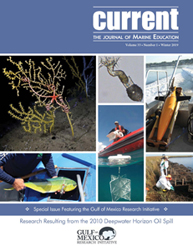Category Archives: CWC
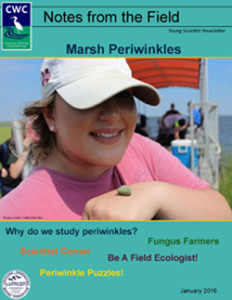
Notes from the Field is an educational newsletter created for middle school students that focuses on issues relevant to coastal communities in southeast Louisiana and the Gulf of Mexico. Exploring topics ranging from periwinkle snails to tropical storms to coastal erosion, each issue includes educational hands-on activities, puzzles, term glossaries, interviews with scientists, and scientific Read More
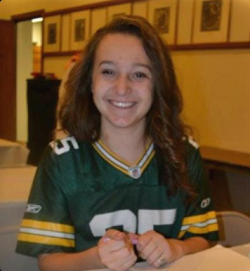
Kendall is an oceanography Ph.D. student at Louisiana State University and a researchers with the Coastal Waters Consortium (CWC). She is in the early stages of her research investigating the transport of suspended sediment in coastal Louisiana. Get to know more about Kendall, her background, and her Barataria Bay research here.
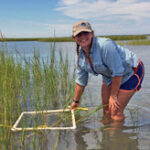
Major disturbances such as oil spills can significantly affect populations of vulnerable saltmarsh species, which may result in greater impacts to the overall saltmarsh food web. Shelby Ziegler believes that a better understanding of what saltmarsh predator-prey interactions look like today can help identify changes in the food web following disturbances in the future. “If Read More

Dr. Shivarudrappa is a Coastal Waters Consortium (CWC) researcher who examines the taxonomic identification of benthic invertebrate fauna to assess how the 2010 Deepwater Horizon oil spill impacted their community. Learn more about his research and scientific journey here.
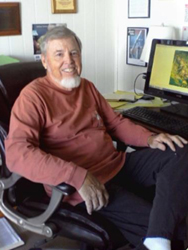
Carter is a Coastal Waters Consortium (CWC) researchers and the chief scientist for the National Center for Airborne Laser Mapping (NCALM), where he collects research-quality airborne lidar, digital photography, and hyperspectral observations for researchers. Learn more about his background and research here!
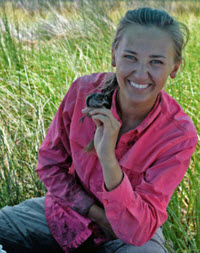
Seaside Sparrows live and forage in coastal Gulf of Mexico marshlands, some of which were oiled following the Deepwater Horizon incident. Sparrows in these oiled marshes likely ingested invertebrates that were also exposed to oil. Allison Snider uses DNA analyses to investigate potential long-term changes in the diets of Seaside Sparrows following Deepwater Horizon. She hopes that her findings will Read More

Mariotti is a geobiologist developing a model to predict the rate at which marshes retreat due to waves and pond formation. His research with the Coastal Waters Consortium (CWC) will help predict future marsh loss and identify strategies to reduce it. Learn more about his background and research here!
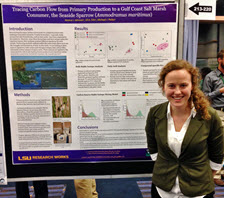
Salt marshes support commercially and culturally important species and are often subject to natural and human-caused stressors. Gaps in our knowledge of salt marsh food webs made management and restoration decisions difficult after the Deepwater Horizon spill. Jessica Johnson helps fill this gap using novel chemical analysis techniques to describe the diets of salt marsh organisms and trace how Read More

Since 2011, LUMCON has been host to groups of undergraduate students taking part in the Research Experience for Undergraduates (REU) Program. The REU Program helps student interns interested in scientific careers gain experience conducting research in the field. CWC will profile these students and their research through a series of blog and social media posts. Read More

The clip invites viewers to tour the research vessel alongside Board of Regents members and learn about the research that scientists conduct during cruises. Watch the tour!

A recent blog post describes how consortium scientists Giovanna McClenachan and R. Eugene Turner used GoPro® cameras to photograph a study site at two-hour intervals during four- to six-week periods between August 2014 and September 2015. Read about their findings here and check out the resulting time-lapse video!
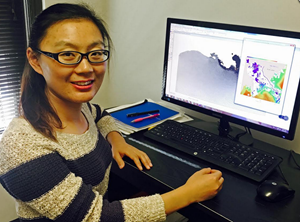
When oil from the Deepwater Horizon spill began approaching land, one proposed response was to divert Mississippi River water and sediment into the marshes to try and push surface oil more towards the Louisiana-Texas shelf. Linlin Cui is investigating the impacts of Mississippi River diversions on Barataria Bay hydrodynamics to help inform how future oil Read More
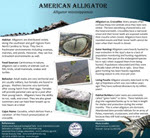
These fact sheets highlight various flora and fauna living in the south Louisiana marshes. Click the images below to download copies of these posters to share with your students. Visit the Coastal Water Consortium’s Education & Outreach website for more information. American Alligator Poster Needlerush Poster Roseate Spoonbill Poster Marsh Periwinkle Snail Poster Fiddler Crab Read More

Professor Nancy Rabalais (LUMCON) and her team focus their research on the effects of the Deepwater Horizon Oil Spill on coastal ecosystems – particularly the Louisiana wetlands and marshes. The creators of award-winning environmental series Journey to Planet Earth (hosted by Matt Damon) present Dispatches from the Gulf – an upcoming documentary film and educational Read More
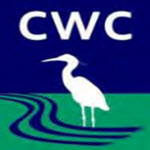
The first three years of Coastal Waters Consortium (CWC-I) began September 2011 and ended December 2015. The second three years of Costal Waters Consortium (CWC-II) began January 1, 2015 and extends until the end of December 2017. Meet some of the many researchers up-close and personal in the following links: CWC-I Scientist Spotlights CWC-II Scients Read More
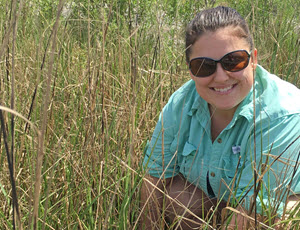
Elizabeth Robinson studies blue crab’s role in the northern Gulf of Mexico food web, looking closely at how Deepwater Horizon oil might have affected the natural predator-prey balance. Many people who hear the phrase ‘marine life’ typically think first about big ocean animals like whales and dolphins. Elizabeth explained why smaller marine animals – like Read More
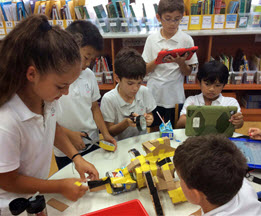
Communicating oil spill research is essential to improve society’s understanding about spills and their ability to respond to and mitigate them. The Gulf of Mexico Research Initiative (GoMRI) has been funding spill-related research since 2010. Here are ten outstanding education products and resources that GoMRI and its science community have developed to share what they Read More
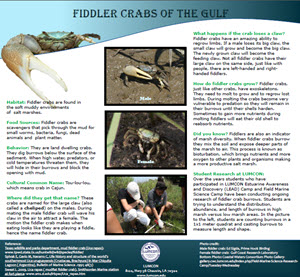
Want to know more about the fiddler crab? Click here to download the Coastal Waters Consortium (CWC) Fact Sheet on the Fiddler Crab’s habitat, food sources, behavior, cultural common name, and many more interesting facts. Over the years, students who have participated in Louisiana Universities Marine Consortium (LUMCON) Estuarine Awaremess and Discovery (LEAD) Camp and Field Marine Read More
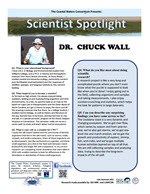
Chuck Wall has a B.A. in Biology and Environmental studies from Williams College, and a Ph.D. in Marine and Atmospheric Sciences from Stony Brook University. He works with the Coastal Waters Consortium (CWC) studying the salt marsh habitat and the community of benthic organisms that live in the salt marsh, such as worms, snails, mussels, Read More

The lesson plans below are related to oil spill research. Some of these lesson plans are general, and it may be necessary to modify the activities for specific grade levels. Coral de las aguas profundas ‘Bichos una Aventura en Miniatura’ Golfo de Mexico EdiciÓn Modelando la Costa Extracción de Aceite Cámara Gusano “Wormcam” Alerta! Emergencia Read More
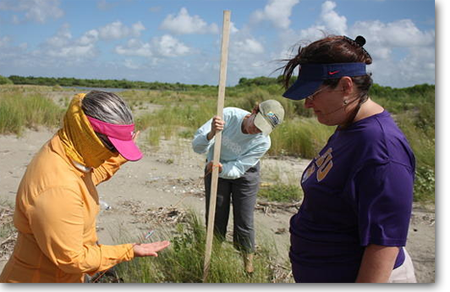
The Coastal Waters Consortium’s Education and Outreach program translates research investigating the effects of the Deepwater Horizon Oil Spill on coastal ecosystems into understandable formats for all levels of society. The program facilitates interactions of students, teachers, adults and other community members with CWC Scientists through the following initiatives and programs: K-12 Education Teacher Education Read More
The Coastal Waters Consortium (CWC) came together in early 2012 to assess the chemical evolution, biological degradation, and environmental stresses of petroleum and dispersant within Gulf of Mexico coastal and shelf ecosystems. CWC research and education and outreach programs are funded for 3 years by the Gulf of Mexico Research Initiative. The Gulf of Mexico Read More
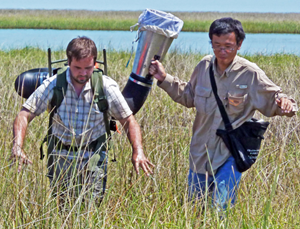
Can watching ants really contribute to understanding an oil spill? Yes, it can! Ants have acted as indicators of environmental change in the past. After oil from the Deepwater Horizon spill entered his research sites, Xuan Chen began uncovering new ways that ants can act as bioindicators of oil’s presence in and impacts on Louisiana Read More
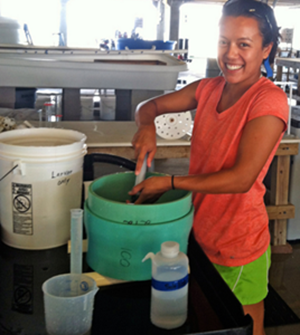
Maria Vozzo’s strong interest in Deepwater Horizon research led her from North Carolina to Louisiana to study the oil’s effects on local oysters. Her work has a wide scope, from the oyster’s environmental conditions to their cellular responses. Maria’s creative adaptation of commercial oyster equipment for her research may also improve them for fisherman’s use. Read More
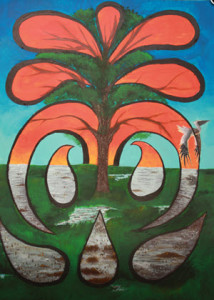
Each summer, parents send their children to camp, trying to match their interests while broadening their horizons. This year, the parents of ten Louisiana students hit the jackpot: the Coastal Waters Consortium (CWC) inaugural Art and Science Camp. This camp challenged participants, engaging both their analytical and creative talents to learn about a locally-relevant and Read More
The purpose of this site is to inform the public of current scientific research and education activities being conducted by the Coastal Waters Consortium which is funded through the Gulf of Mexico Research Initiative.
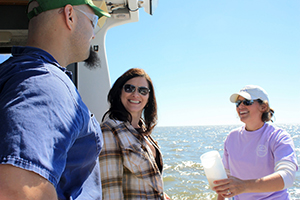
An old philosophical question asks, “If a tree falls in a forest and no one is around to hear it, does it make a sound?” Similarly, if a scientist makes an important discovery and people do not hear about it, will it matter? Scientists are conducting research about oil and other impacts on coastal marine Read More
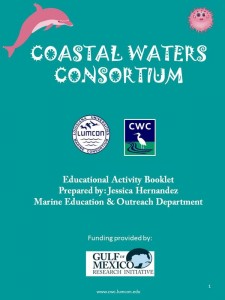
A fun and educational activity book that teaches children about the 2010 Deepwater Horizon oil spill and other marine science topics related to the Gulf of Mexico. Click to download PDF (2 MB) Click to download PDF – Spanish (2 MB)
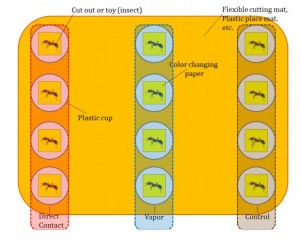
Many times, people think about the environmental impacts of an oil spill and the main organisms (impacted) that come to mind are marine mammals, crustaceans, fish, birds, and even mollusks. Insects are often forgotten, but some species are closely associated to soil and plant life; therefore, some insects are of high ecological value. Some insects Read More
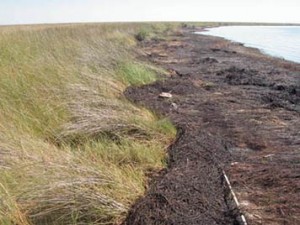
Coastal wetland vegetation is essential to the coastal area because it provides a barrier for the local community, a nursery habitat for juvenile organisms, and a highly productive environment for the marine life. This form of vegetation has a very high potential to come in contact with pollution, originating from inshore or offshore sources, because Read More
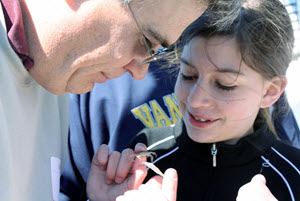
“My mom would love this boat ride.” “I wish my child could walk the marshes.” Murt Conover, Senior Marine Educator and Aquarist with the Coastal Waters Consortium (CWC), often hears comments like these when leading teacher and student groups at the Louisiana Universities Marine Consortium (LUMCON) facility. She thought it seemed like a “no brainer” Read More
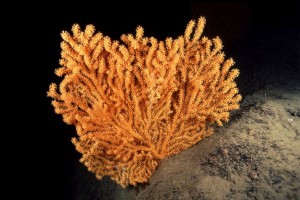
Deepwater coral reefs, aptly known as cold-water coral reefs, can be formed by the carbon created when bacteria biodegrade oil from natural seeps nearby. Oil spills can be easily devastating to coral reefs, ranging from the reefs at the surface of the water, directly subsurface, and even cold-water corals.

